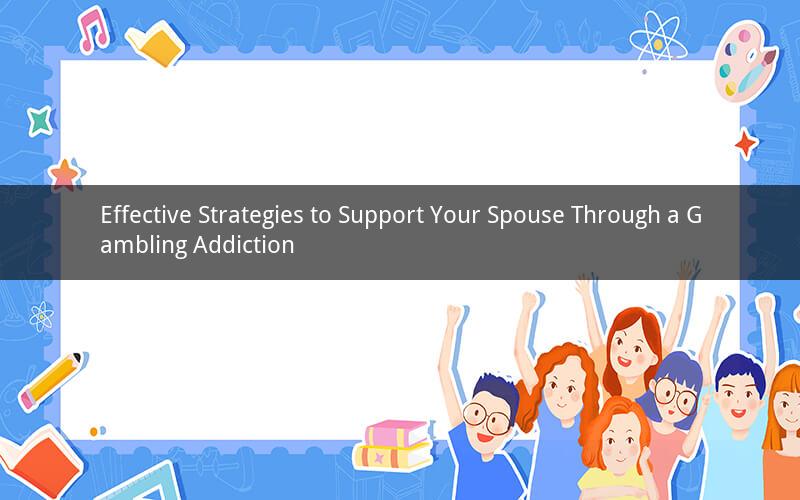
Introduction:
Gambling addiction is a serious issue that can take a toll on both individuals and their families. If you suspect that your spouse has a gambling problem, it's crucial to know how to help them overcome this addiction. This article provides practical strategies and support methods to assist your spouse in their journey towards recovery.
1. Educate Yourself:
Understanding the nature of gambling addiction is the first step towards helping your spouse. Educate yourself about the signs, symptoms, and consequences of gambling addiction. This knowledge will enable you to provide appropriate support and guidance.
1. Encourage Open Communication:
Create a safe and supportive environment for open communication with your spouse. Encourage them to share their feelings, fears, and struggles related to their gambling addiction. Be patient and non-judgmental, as this can be an emotionally challenging process for them.
2. Seek Professional Help:
Encourage your spouse to seek professional help from a therapist or counselor specializing in gambling addiction. Therapy can provide them with the necessary tools and techniques to overcome their addiction. Support your spouse in attending therapy sessions regularly.
3. Financial Support:
One of the significant challenges faced by individuals with gambling addiction is financial instability. Offer your support by assisting them in managing their finances. Help them create a budget, prioritize essential expenses, and explore options for debt consolidation or counseling.
4. Encourage Participation in Support Groups:
Support groups can be a valuable resource for individuals with gambling addiction. Encourage your spouse to join a support group where they can connect with others who understand their struggles. These groups provide a platform for sharing experiences, receiving encouragement, and gaining insights into recovery.
5. Create a Supportive Network:
Surround your spouse with a supportive network of friends and family members who are committed to their recovery. Encourage them to spend time with individuals who have similar values and goals. This network can provide emotional support, practical advice, and a sense of belonging.
6. Set Boundaries:
Establish clear boundaries to protect yourself from the negative consequences of your spouse's gambling addiction. This may include setting financial limits, limiting access to gambling activities, or even separating certain financial responsibilities. Communicate these boundaries clearly and consistently.
7. Encourage Healthy Coping Mechanisms:
Gambling addiction often leads to negative coping mechanisms such as substance abuse or isolation. Encourage your spouse to explore healthier alternatives, such as exercise, hobbies, or joining social clubs. These activities can provide a positive outlet and reduce the urge to gamble.
8. Practice Patience and Understanding:
Recovery from gambling addiction is a long-term process that requires patience and understanding. Recognize that setbacks may occur, and be there to support your spouse through these challenging times. Celebrate small victories and progress, as they contribute to the overall journey towards recovery.
9. Take Care of Yourself:
It's important to prioritize your own well-being while supporting your spouse. Seek support for yourself through counseling or support groups for loved ones of individuals with gambling addiction. Taking care of yourself will ensure that you can provide consistent and effective support to your spouse.
10. Encourage Relapse Prevention:
Relapse is a common challenge in the recovery process. Encourage your spouse to develop relapse prevention strategies, such as identifying triggers and developing coping mechanisms for high-risk situations. Support them in staying committed to their recovery goals.
Questions and Answers:
1. What are the signs of gambling addiction?
Ans: Signs of gambling addiction include secretive behavior, financial difficulties, neglecting responsibilities, mood swings, and an increasing need to gamble to relieve negative emotions.
2. How can I communicate effectively with my spouse about their gambling addiction?
Ans: Use "I" statements to express your concerns without placing blame. Be non-judgmental and focus on your feelings and observations. Listen actively and show empathy towards their struggles.
3. Can therapy alone help someone overcome a gambling addiction?
Ans: Therapy is a valuable component of gambling addiction recovery, but it is often most effective when combined with other support methods, such as financial management, participation in support groups, and maintaining a supportive network.
4. How can I help my spouse manage their finances during recovery?
Ans: Assist your spouse in creating a budget, prioritizing essential expenses, and exploring options for debt consolidation or counseling. Offer emotional support and encourage them to seek professional help if needed.
5. What can I do if my spouse refuses to seek help for their gambling addiction?
Ans: Continue to express your concerns and offer support, but be prepared for resistance. Consider seeking guidance from a professional who can provide strategies for dealing with non-compliance and encourage your spouse to seek help.